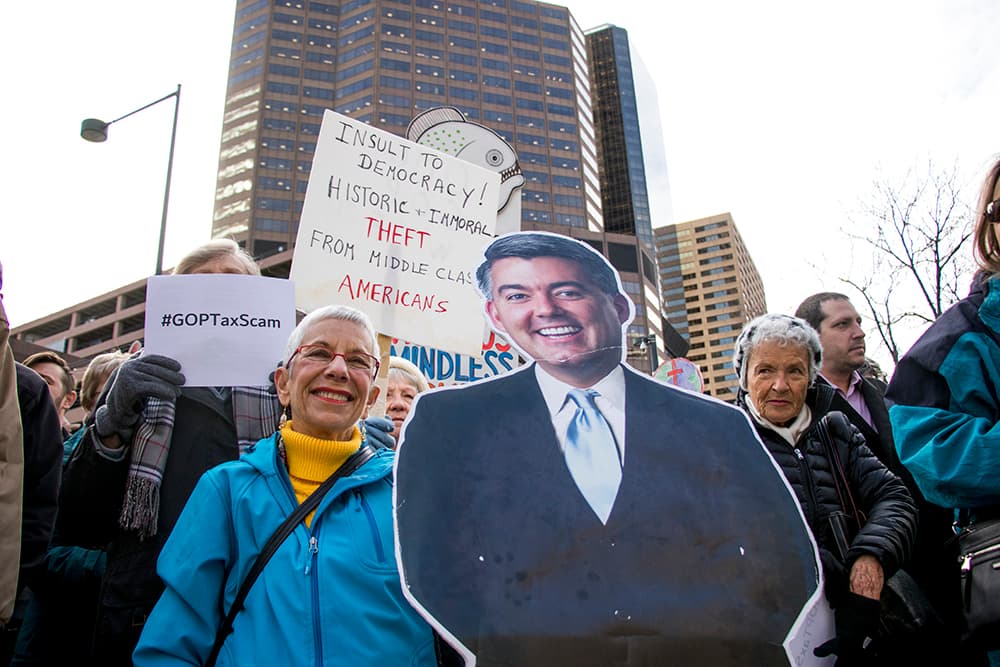Even though other candidates had filed paperwork declaring their intentions to run, it was Lorena Garcia who garnered headlines dubbing her Sen. Cory Gardner’s first challenger.
She said announcing early gave her time to start campaigning with transparency. As a first-time candidate, it probably helped her start covering some ground. Now, she’s working her way to standing shoulder-to-shoulder with more established candidates hoping to be the Democratic Party’s candidate.
Like other first-time candidates, however, she’s not new to the political scene. Her background is in community organizing, with an emphasis on social justice.
“For me, my entire career as an organizer working in the social justice movement has been about dignity,” Garcia said. “Making sure that we as human beings have our dignity and that no policy or rule can violate that.”
Garcia, 36, said her ideas “absolutely fall in line” with being a Democratic Socialist. There are people who have associated her with New York Congresswoman Alexandria Ocasio-Cortez, and she does agree with some of Bernie Sanders’ ideas.
“Clearly, our policies are the same,” Garcia said. “The reality is, I’m my own person. I’m my own candidate. I have my own experience that is getting me to this place where I am qualified to run for this seat.”
The Denver resident comes from a long line of Coloradans (seven generations on her dad’s side, to be exact), including those who were active organizers. She remembers rallying against the controversial Amendment 2 in 1992. The law targeted the LGBTQ community and led to Colorado earning the nickname the “hate state.” It was later deemed unconstitutional.
“I think people are ready for something different,” Garcia said. “People are ready for a different kind of leadership. Somebody who is not in it just for the power. And that’s why I think my candidacy has a really good shot. Underdog or not.”
Garcia’s plans call for economic opportunities created by pushing for several progressive ideas.
It’s not just about jobs. She said it’s about making sure that people have health care: “If you’re not healthy, how can you work, how can you be productive?”
She’s supportive of a single-payer system, which she said can open the doors to more health care related jobs.
It also calls for an accessible education system. She’s a supporter of tuition-free college, adding that since people have been investing in government, it’s time for the government to invest in the people.
Does she worry about how these ideas will resonate in other parts of the state, like those outside the Front Range?
“The reality is, a message about economic opportunity, and making sure that we establish opportunities for everybody to thrive economically, that is what’s going to resonate,” Garcia said. “Because in rural Colorado, where you have one-industry towns, those towns are so susceptible to bust and boom that if we don’t work specifically to help diversify industries … we’re not supporting them economically.”

One idea she’s floated is pushing for a value-added tax (which the U.S. doesn’t currently have) on corporations. The Wall Street Journal points out most of the industrialized world uses a VAT, which it describes as a tax on “what people consume rather than how much they earn.”
Garcia believes that a VAT could ensure corporations are paying “their fair share” as employees are eliminated due to automation. She’s also calling for returning the corporate income tax rate to 35 percent after it was reduced to 21 percent under President Donald Trump’s tax plan.
“None of these programs are free,” Garcia said. “We all have to pay for it. But if we can all pay for them collectively, it’s cheaper for all of us.”
Garcia said she’s dedicated her life to helping people through nonprofit work.
She currently works as executive director of the Colorado Statewide Parent Coalition, which is a nonpartisan group focused on helping Latino families navigate the education system. She used to work with Latino students at Denver West High School, where she worked in a conflict and anger management class for students on the verge of expulsion.
The experience led to an epiphany that led her to her next jobs, where she focused on crafting policy. She worked on statewide bills addressing sex education and a bill banning the shackling of pregnant inmates in Colorado.

“I can do this individual, direct service work, but what I’m passionate about is the system, attacking the system,” Garcia said. “How can we address the systems that are putting our kids and are putting people in these situations?”
History is on the line for Garcia.
She would be Colorado’s first woman senator, and the first Latina and first lesbian to represent Colorado in Congress. She’s not really focusing on that right now, though she did call it “outrageous” that Colorado is among several states to never elect a woman senator or governor.
“That’s not why I’m doing this,” Garcias said. “Those are important steps, those are important things that we need to do.”
Garcia is one of two women currently running for the Senate. The other is scientist Trish Zornio.
Here are the Democrats running against Gardner so far.
These are the people who have announced:
- Former state Sen. Mike Johnston
- Community organizer Lorena Garcia
- Navy veteran Keith Pottratz
- Former House Speaker Andrew Romanoff
- Scientist Trish Zornio












